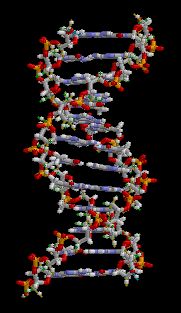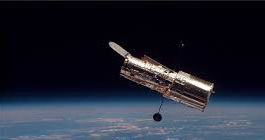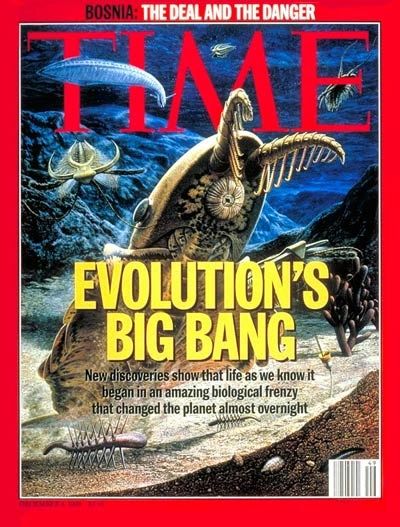
The Evolution of Life,
is it Random or Directed Evolution?
Like everyone else in school, I learned the ideas of classical Darwinian Evolution which states that random changes in the genetic code provide a survival advantage which is then "selected" by natural selection, and this somehow accounts for the evolution of simple one celled organisms into more complex land mammals. Since the early days, scientists have made new discoveries that required us to modify our understanding of evolution. Professional biologists have revised their theories of evolution since the time of Darwin.
Darwinian Evolution
Darwinian evolution would have us believe that the first DNA molecule (which is the basic genetic blueprint for all life) was created by the random assembly of nucleotide base pairs. This would seem plausible on the surface.
Age of the Universe Inconsistent With Randomness
 Above image courtesy of NASA Hubble Telescope.
Above image courtesy of NASA Hubble Telescope.
However, we know from physics and astronomy that the age of the universe is 12-15 billion years old. This is based on Hubble telescope measurement of the Doppler shift of light from stars. We also know that the structure of DNA is a double helix and contains dense information, like a very long computer program. The structure of DNA was uncovered by Watson, Crick and Wilkins who worked out the double helix structure of DNA in 1953, and received the Nobel Prize in 1962. Calculations based on the age of the universe and the structure of DNA show that 12-15 billion years simply wasn't enough time for the base pairs of DNA to have randomly formed into the genetic code. Perhaps life and the genetic code did not arise by randomness after all.
 Lack of Gradual Change in the Fossil Record
Lack of Gradual Change in the Fossil Record
The additional discrepancy of Darwinian evolution theory is the problem of missing transitional life forms in the fossil record. Darwin predicted the fossil record would show gradual transitions between different species. The transition forms Darwin expected in the fossil record were never found. Instead they found the "Cambrian Explosion", and Stephen Gould's theory of "Punctuated Equilibrium" was formulated to explain the gaps and discontinuities in the fossil record. See cover of Time Magazine at left.
Unanswered Questions of the Theory of Darwinian Evolution:
1) How does random change (mutation) in the genome add information to a genome to create progressively more complicated organisms? It Doesn't.
2) How is evolution able to bring about drastic changes so quickly? An example is the Cambrian Explosion. It Can't.
3) How could the first living cell arise spontaneously to get evolution started? It couldn't.
4) The Human Genome Project showed that only 1-2% of Human DNA codes for proteins, or about 25,000 genes. These are not enough to account for the complexity of the organism. What is the other 98% of the genome's function? We don't know.
Falsifiability
Karl Popper raised the point that for a theory to be science, it has to be falsifiable. We have no method to falsify the theory of Darwinian Evolution suggesting that it is a belief rather than science.
Directed Evolution
Perhaps the most promising new theory of evolution is "Directed Evolution" described in Michael J. Denton's Book. Denton suggests a concept called "directed evolution" in which changes in the genetic code leading to speciation (new species), which were previously thought to be caused by random mutations, are instead "directed" by the genomic information contained in the DNA (possibly in the noncoding portion of DNA previously called "junk DNA").
An Analogy from Embryology
An analogy is drawn from embryology, in which the genetic code in the DNA directs the tiny embryo to follow well defined steps to "evolve" into the mature organism. This idea can be applied to evolutionary theory itself. The genetic code itself, the intracellular nuclear DNA could contain "directed information" for the steps leading from primitive life forms to more complex life forms in over billions of years of evolution. I am sure we will see more of these fascinating ideas in print over the next few years.
Evo-Devo
Another new approach is called evo-devo and Sean Carrol's Book Endless Forms Beautiful attempts to reconcile new findings in molecular biology and embryology with the theory of evolution.
Gert Korthof
If you plan to study the topic of evolution, a good place to start is Gert Korthof's web site which reviews current literature on evolution, intelligent design, evo devo, molecular biology, etc.
Is There An Intelligent Design to Life and the Universe?
One might argue that Science is the study of the natural design, and as such, presupposes that the universe is orderly. This means that Science presupposes the concept of "Intelligent Design". The problem is that although Science first presupposes that there is an Intelligent Design of the Universe, it then ignores this presupposition, claiming that there is no scientific evidence for Intelligent Design. This is actually a semantic argument, or a verbal sleight of hand.
This brings us to the "Intelligent Design" argument and the question of "is there a creator of the universe?" This is an obvious question raised from biology, which reveals DNA, the genetic code and complex life forms in the world. All life forms share the same underlying genetic code which translates base pairs into proteins. The existance of a code, or "alphabet" is a language which implies an underlying intelligence for its creation. Coded messages do not happen by random happening. This DNA code was either designed by an intelligence, or not. I will leave it up to you to decide for yourself.
The Watch Maker Argument
Here it the original discussion of
The Watch and the Watch-Maker Argument:
Originally credited to William Paley (1743-1805).
Science and the concept of "Intelligent Design" have more in common than you might think. For example, if you were walking on the beach and came across a functioning clock or watch on the sand, would you assume that the clock or watch was created by a watchmaker or would you assume the watch parts randomly self assembled on the beach? Science views the universe as a giant watch and tries to figure out how the parts work and where the parts came from. Science assumes that there is a pattern in the watch mechanism that can be understood. It doesn't comment on who made the watch and instead leaves this question open. "Intelligent Design" picks up on this open question and says, "Look at how complex the watch is, there must have been a watchmaker."
Intelligent Design or Designed Intelligently?
"Intelligent Design" is not a scientific theory and does not compete with other scientific theories about the universe and life in it. Rather, "Intelligent Design" is a way of thinking about the questions which Science leaves unanswered. As stated above, Intelligent Design can be regarded as a presupposition to the activity of Scientific Investigation. The subject of scientific discovery and investigation is the order or "design" of the universe.
My Own Opinion
As for myself, looking at the complexity of the universe and life forms, it is self evident (at least to me) that the watch was made by a creator or "watchmaker". Other people may think about it and feel that there is no need to invoke the idea of a watchmaker. That's OK. Each person has their own way of looking at things, and that's what makes the cultural differences which are tolerated and even treasured in our country.
Recommended Reading :
The 2001 Principle Web Site.
, by Gerald Schroeder 1990 Bantam
, by Gerald Schroeder 1997
, by Gerald L. Schroeder 2001
, by Michael J. Denton .Our Environment
Our greatest crisis right now is not the threat of Nuclear War which would annihilate the earth. Our greatest threat is genetic and chemical pollution of the planet. Genetic pollution referrs to GMO genetically modified organisms which have been released into the environment. Chemical pollution referrs to a wide array of chemicals such as mercury, cadmium, lead arsenic, and hormone disruptor chemicals such as pesticides and PCBs.
Unfortunately, the governments of the world have not taken this seriously and we may have already reached the point of irreparable damage. We are stealing our children's futures, since the harmful effects of these toxic substances will continue to increase long after we individually exhaust our small number of days on the planet.
Is global warming from carbon dioxide emission another serious threat to the environment? Or is the earth undergoing climate change as a seasonal and geo-solar variation over the centuries? I will leave that question to you and the experts.
Recommended Reading:
by Theo Colborn,
Dianne Dumanoski, John Peter Meyers
by Lynn Goldman.
by D. Berkson.
by Sandra Steingraber
by Ted Schettler
by John Wargo
Vitamin and Mineral Deficiencies:
Subclinical Vitamin and Mineral deficiencies are real and a major health issue in the United States. For example, Iodine deficiency (as reported in the HANES study) is a major cause of breast cancer. Co-Enzyme Q-10 deficiency is a major cause of congestive heart failure. The Government in the new revised Food Pyramid recommends B12 supplementation for all people over age 50, and Folate supplements to prevent fetal neural tube defects in all women of child bearing age.
The Current Crisis is Medicine:
Corruption involving the FDA and the Ppharmaceutical Drug Industry
In the past 15 years we have seen a succession of new drugs approved by the FDA on the basis of false, misleading or incomplete research data. These drugs have many adverse side effects and are not contributing to the health of the nation, and they should be removed from the market. According to Dennis Cauchon in an article in USA TODAY dated Sep 25, 2000, half the doctors serving on the FDA advisory committees are receiving money directly from the pharmaceutical industry which is a violation of federal law. These advisory committee members receive "waivers" from the FDA to protect them from criminal prosecution. Please call or mail your congressman to stop the "waivers" and restore integrity to the FDA.
Examples of recalled drugs are: Vioxx, Baycol, Rezulin, Lotronex, Propulsid.
Examples of problem drugs still on the market identified by Dr. David Graham of the FDA: Accutane, Meridia, Crestor, Bextra, Serevent. Contact me for a more complete list of problem drugs.
Dr Abramson and Angel think that television drug advertising is blatantly deceptive and should not be allowed. New Zealand and the US are the only two countries that have not banned DTC consumer drug advertising.
Recommended reading:
Marcia Angell, M.D. (c) 2004 Random House
John Abramson, M.D.(c) 2004 HarperCollins
7450 Griffin Rd Suite 180/190
Davie, FL 33314
Phone: 954-792-4663
Blog